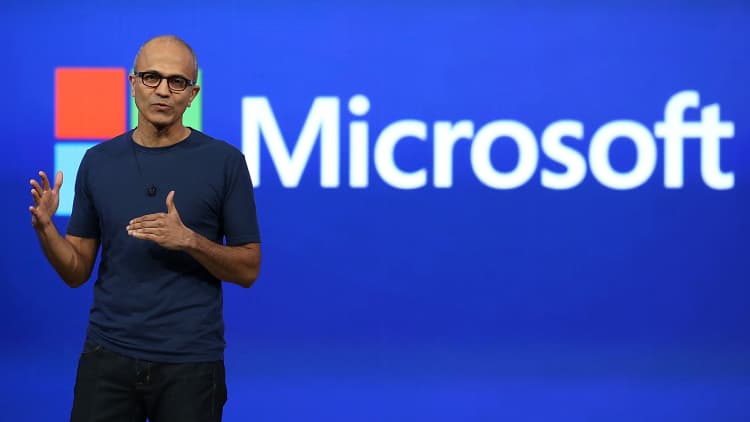There may be no more surprising development in technology over the past year than Microsoft's radical transformation into an industry collaborator.
Long surviving on huge license and maintenance fees for its proprietary Windows and Office software, Microsoft historically wanted to sell you the full stack, from the operating system on your desktop to the security, networking and storage in data center servers. It didn't matter if someone else could do it better.
Satya Nadella, who succeeded Steve Ballmer as chief executive officer a year ago, is doing the once unthinkable: unbundling.
Read MoreMicrosoft's aim to catch Amazon in the cloud
The latest indication of the evolution in Redmond, Wash., came Tuesday, when Microsoft announced mobile integrations with Salesforce.com, Citrix and Box. As part of Microsoft's new Cloud Storage Partner Program, users of Apple iOS devices can fire up Word, Excel or PowerPoint and pull in documents and data from other cloud providers.
To be clear: This means users of non-Microsoft devices can access data stored by Microsoft competitors and edit and save within Microsoft apps. Box Chief Executive Officer Aaron Levie, who spent years criticizing Microsoft's closed approach and lack of innovation, is now openly championing the software giant.
"What Microsoft has been doing under Satya's leadership is recognizing that to be incredibly relevant in the next generation of enterprise and consumer, they need to make sure their individual products are able to stand on their own and compete on their own without being propped up by the complete integration of them all," Levie said in an interview on Tuesday. "There's a lot of momentum around them doing these kinds of partnerships and integrations over the past year."

In November, Microsoft forged a similar arrangement with Dropbox, letting consumers edit and save files from the storage and collaboration service in Office 365. Microsoft is actually easing the way for individuals and teams to use competitive products.
Microsoft is making strides on more than just the consumer side. The company's cloud hosting service Azure, which competes with Amazon Web Services, has partnered with longtime competitors including IBM, Oracle and SAP to sell and support their products.
Levie said the Box integration with Microsoft on iOS is just the beginning. The companies are working to allow files and data from Box to be accessible and editable in Word or PowerPoint from any browser on any device.
Read MoreThe exploding tech sector that puzzles Wall Street
Investors are still waiting to see if Nadella's cultural transformation results in revived growth at Microsoft. The stock is up 15 percent in the past 12 months, just ahead of the gains in the S&P 500.
While commercial cloud revenue, including sales from Office 365 and Azure, jumped 114 percent in the latest quarter from a year earlier, it still represents little more than 5 percent of the overall business. Total revenue rose only 8 percent.
Read MoreAre Box's best days already over?
But Nadella is playing the long game, experts note. And his top lieutenants are falling in line. Here's what Kirk Koenigsbauer, a corporate vice president for the Microsoft Office team, wrote in a blog post tied to Tuesday's announcement:
"Living in a cloud-first, mobile-first world is all about having the flexibility to get things done from anywhere and on any device."
In the past, that sort of message from Microsoft would have come across as jargony rhetoric. Now, even the critics are taking it seriously.


